专四常考语法点汇总定稿版
专四必考语法
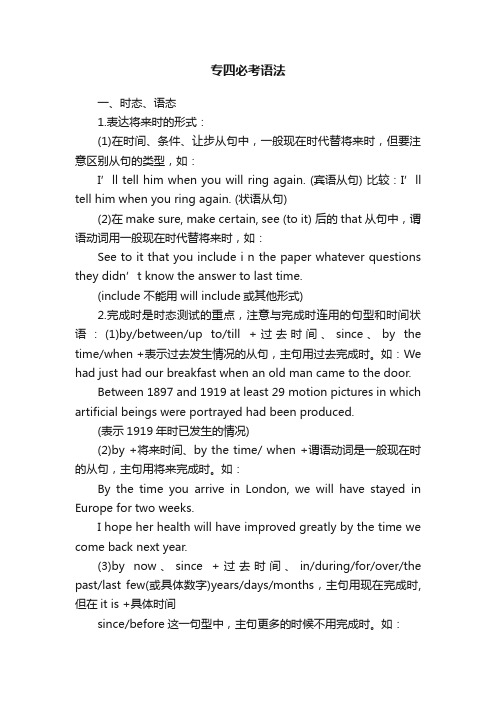
专四必考语法一、时态、语态1.表达将来时的形式:(1)在时间、条件、让步从句中,一般现在时代替将来时,但要注意区别从句的类型,如:I’ll tell him when you will ring again. (宾语从句) 比较:I’ll tell him when you ring again. (状语从句)(2)在make sure, make certain, see (to it) 后的that从句中,谓语动词用一般现在时代替将来时,如:See to it that you include i n the paper whatever questions they didn’t know the answer to last time.(include 不能用will include或其他形式)2.完成时是时态测试的重点,注意与完成时连用的句型和时间状语:(1)by/between/up to/till +过去时间、since、by the time/when +表示过去发生情况的从句,主句用过去完成时。
如:We had just had our breakfast when an old man came to the door.Between 1897 and 1919 at least 29 motion pictures in which artificial beings were portrayed had been produced.(表示1919年时已发生的情况)(2)by +将来时间、by the time/ when +谓语动词是一般现在时的从句,主句用将来完成时。
如:By the time you arrive in London, we will have stayed in Europe for two weeks.I hope her health will have improved greatly by the time we come back next year.(3)by now、since +过去时间、in/during/for/over/the past/last few(或具体数字)years/days/months,主句用现在完成时, 但在it is +具体时间since/before这一句型中,主句更多的时候不用完成时。
英语专四语法考点总结
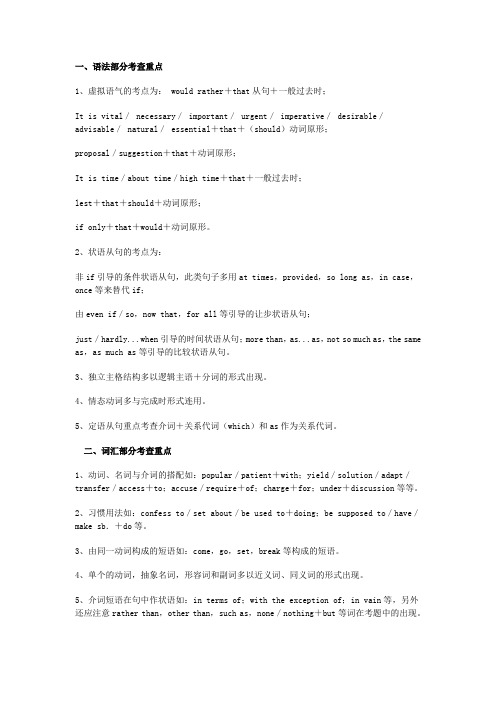
一、语法部分考查重点1、虚拟语气的考点为: would rather+that从句+一般过去时;It is vital/ necessary/ important/ urgent/ imperative/ desirable/advisable/ natural/ essential+that+(should)动词原形;proposal/suggestion+that+动词原形;It is time/about time/high time+that+一般过去时;lest+that+should+动词原形;if only+that+would+动词原形。
2、状语从句的考点为:非if引导的条件状语从句,此类句子多用at times,provided,so long as,in case,once等来替代if;由even if/so,now that,for all等引导的让步状语从句;just/hardly...when引导的时间状语从句;more than,as...as,not so much as,the same as,as much as等引导的比较状语从句。
3、独立主格结构多以逻辑主语+分词的形式出现。
4、情态动词多与完成时形式连用。
5、定语从句重点考查介词+关系代词(which)和as作为关系代词。
二、词汇部分考查重点1、动词、名词与介词的搭配如:popular/patient+with;yield/solution/adapt/transfer/access+to;accuse/require+of;charge+for;under+discussion等等。
2、习惯用法如:confess to/set about/be used to+doing;be supposed to/have/make sb.+do等。
3、由同一动词构成的短语如:come,go,set,break等构成的短语。
完整版专四英语语法考点

语法考点之一:虚拟语气考点1. If从句中的虚拟语气1、与过去事实相反:从句sb had done,主句sb would(should,could,might)+ have done;1. I ___the party much more if there hadn’t been quite such a crowd of people there. 1996A. would enjoyB. will have enjoyedC. would have enjoyedD. will be enjoying2. All of us would have enjoyed the party much more if there ___ quite such a crowd of people there.2000A. weren’tB. hasn’t beenC. hadn’t beenD. wouldn’t省略if,从句的语序用到装,即将were,had或should移至主语的前面,但否定词not不前移。
3. Had Judy been more careful on the maths exam, she ____ much better results now. 2008A. would be gettingB. could have gotC. must getD. would get4. ______you were busy, I wouldn’t have bothered you with my questions. 1994A. If I realizedB. Had I realizedC. I realized thatD. As I realized5.___, he would not have recovered so quickly. 1995A. Hadn't he been taken good care ofB. Had he not been taken good care ofC. Had not he been taken good care ofD. Had he been not taken good care of6. ___for the fact that she broke her leg, she might have passed the exam. 2002A. Had it not beenB. Hadn’t it beenC. Was it notD. Were it not2、与现在事实相反:从句sb did(were),主句sb would(should, could, might)+do;1. If there were no subjunctive mood, English _____ much easier to learn.2009A. could have beenB. would beC. will beD. would have been2. If you explained the situation to your solicitor, he ________ able to advise you much better than I can.2005A. would beB. will have beenC. wasD. Were3、与将来事实相反:从句sb did (should+do或were+to do),主句sb would (should, could, might)+do。
(完整word版)专四语法重点总结,推荐文档
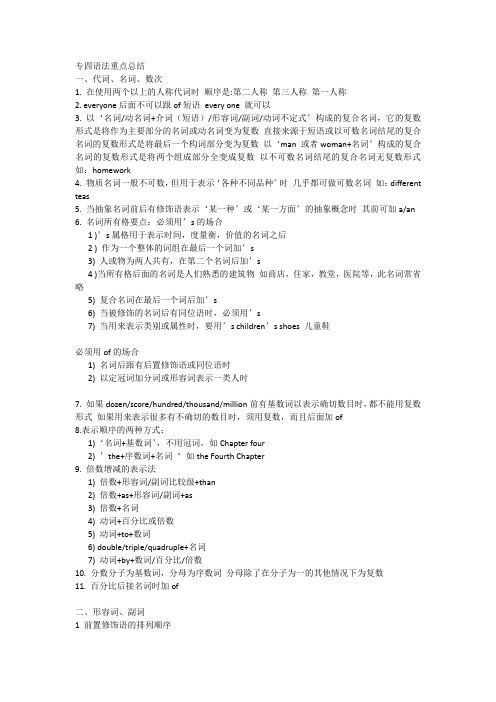
专四语法重点总结一、代词、名词、数次1. 在使用两个以上的人称代词时顺序是:第二人称第三人称第一人称2. everyone后面不可以跟of短语every one 就可以3. 以‘名词/动名词+介词(短语)/形容词/副词/动词不定式’构成的复合名词,它的复数形式是将作为主要部分的名词或动名词变为复数直接来源于短语或以可数名词结尾的复合名词的复数形式是将最后一个构词部分变为复数以‘man 或者woman+名词’构成的复合名词的复数形式是将两个组成部分全变成复数以不可数名词结尾的复合名词无复数形式如:homework4. 物质名词一般不可数,但用于表示‘各种不同品种’时几乎都可做可数名词如:different teas5. 当抽象名词前后有修饰语表示‘某一种’或‘某一方面’的抽象概念时其前可加a/an6. 名词所有格要点:必须用’s的场合1 )’s属格用于表示时间,度量衡,价值的名词之后2 ) 作为一个整体的词组在最后一个词加’s3) 人或物为两人共有,在第二个名词后加’s4 )当所有格后面的名词是人们熟悉的建筑物如商店,住家,教堂,医院等,此名词常省略5) 复合名词在最后一个词后加’s6) 当被修饰的名词后有同位语时,必须用’s7) 当用来表示类别或属性时,要用’s children’s shoes 儿童鞋必须用of的场合1) 名词后跟有后置修饰语或同位语时2) 以定冠词加分词或形容词表示一类人时7. 如果dozen/score/hundred/thousand/million前有基数词以表示确切数目时,都不能用复数形式如果用来表示很多有不确切的数目时,须用复数,而且后面加of8.表示顺序的两种方式:1)‘名词+基数词’,不用冠词,如Chapter four2) ’the+序数词+名词‘如the Fourth Chapter9. 倍数增减的表示法1) 倍数+形容词/副词比较级+than2) 倍数+as+形容词/副词+as3) 倍数+名词4) 动词+百分比或倍数5) 动词+to+数词6) double/triple/quadruple+名词7) 动词+by+数词/百分比/倍数10. 分数分子为基数词,分母为序数词分母除了在分子为一的其他情况下为复数11. 百分比后接名词时加of二、形容词、副词1 前置修饰语的排列顺序可以置于冠词前的形容词(all both such) -----冠词,指示形容词,所有格形容词,不定形容词(a an the this your his any some)-----------基数词(one ) 序数词(first)------------ 表示性质,状态,质量的形容词(good useful)--------------表示大小,长短,形状的形容词----------------表示年龄,新旧,温度的形容词------------表示颜色的形容词---------------------表示国籍,产地,区域的形容词-----------表示材料,用做形容词的名词----------动名词,分词2.后置修饰语由前缀a-构成的形容词3.形容词修饰由some-,any-,every-,no-,-body,-one,-thing等组成的复合不定代词时,必须后置4.enough作形容词修饰名词时既可放前又可放后,但当它作副词修饰形容词或副词时,必须后置5.有些形容词本身就有‘比……年长’,‘比……优等的意思这些形容词后面用介词to 而不用than6.much too 作为副词短语修饰形容词或副词,不修饰名词7.more 不能用来修饰比较级8.与名词连用的more of a .. ./ as much of a... / more of a.... 意为更像……9.as much of a……意为称得上,less of a 意为算不上10.none other than(不是别人,正是)=no other than11.any/sone/every与other连用时,其后若用可数名词,一般为单数三、情态动词、虚拟语气1.can 用于否定句cannot(help)but表示不能不,只能(but后跟不带to的动词不定式)2.must 表示禁止,一定不要时的否定式为mustn’t 当它表示有把握的推断时意为一定准是时它的否定形式为can’t3.need doing=need to be done 这个句型表示被动意味4.need not have done sth 表示本来没有必要做某事(经常考)虚拟语气1.It is (high/about/the)time... 谓语动词用过去式指现在或将来的情况表示早该做某事而现在已经有点晚了2.It is the first(second/third)time后的that从句中,谓语动词要用完成体来表示一种经验3.as if/though 的虚拟要点1) 对当时事实的假设,从句谓语用过去式,be动词一律用were2)对过去事实的假设,从句谓语用过去完成式3)对未来事实的假设,从句谓语用would+动词原型五、比较级比较等级的含义:英语中形容词与副词有三个比较等级,即原级,比较级和最高级。
专四语法汇总

专四常考语法点汇总:一.虚拟语气1.虚拟条件句1) 倒装结构:条件句有were, had, should时,可使用倒装结构。
e.g. Were it necessary, I would resign.Had you informed me earlier, I would have come over.Should you meet her, you should not be able to recognize her.2) 错综时间条件句e.g. If I my umbrella with me this morning, I wet now.A. had taken … would not have beenB. took… should not beC. were to take … would not beD. had taken … should not be (D)3) 无条件的虚拟句:but for, with, without, or, but, otherwise, in case of, what if, etc.2.I wish…/If only句式:与现在事实相反,用were或动词的一般过去式;与过去事实相反,用had+过去分词;表示将来没有把握或不太可能实现的愿望,用would/could/should/might+动词原形。
3.as if引导的从句(注意区别事实与假设)Some black clouds are floating in the sky. It looks as if .A.it might rainB.it is going to rainC.it would be rainyD.it was to rain (B)4.在suggest, order, demand, propose, desire等表示建议、命令、态度等词(包括动词和名词)引导的名词从句中用should+动词原形,should可省。
专四常考语法点
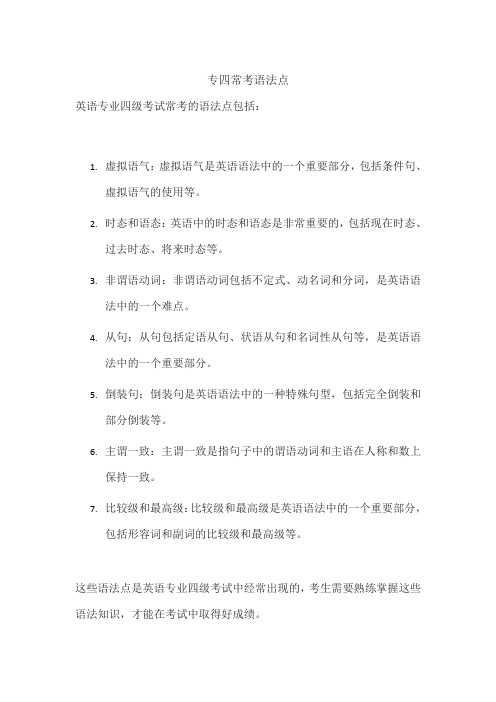
专四常考语法点
英语专业四级考试常考的语法点包括:
1.虚拟语气:虚拟语气是英语语法中的一个重要部分,包括条件句、
虚拟语气的使用等。
2.时态和语态:英语中的时态和语态是非常重要的,包括现在时态、
过去时态、将来时态等。
3.非谓语动词:非谓语动词包括不定式、动名词和分词,是英语语
法中的一个难点。
4.从句:从句包括定语从句、状语从句和名词性从句等,是英语语
法中的一个重要部分。
5.倒装句:倒装句是英语语法中的一种特殊句型,包括完全倒装和
部分倒装等。
6.主谓一致:主谓一致是指句子中的谓语动词和主语在人称和数上
保持一致。
7.比较级和最高级:比较级和最高级是英语语法中的一个重要部分,
包括形容词和副词的比较级和最高级等。
这些语法点是英语专业四级考试中经常出现的,考生需要熟练掌握这些语法知识,才能在考试中取得好成绩。
专四语法词汇部分考查重点与重点词组归纳
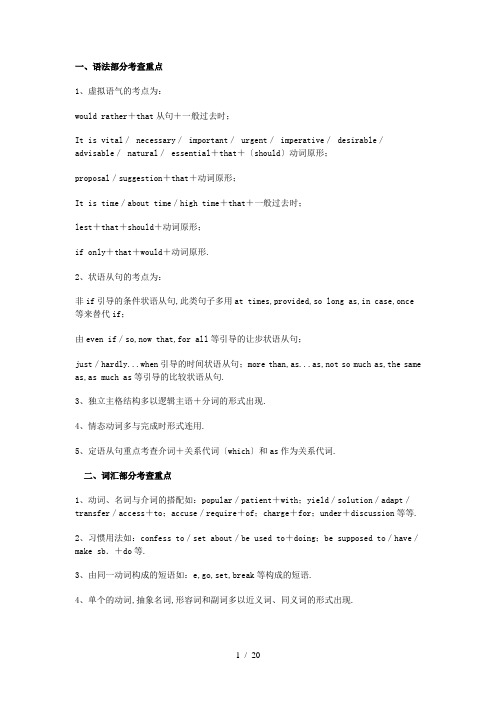
一、语法部分考查重点1、虚拟语气的考点为:would rather+that从句+一般过去时;It is vital/ necessary/ important/ urgent/ imperative/ desirable/advisable/ natural/ essential+that+〔should〕动词原形;proposal/suggestion+that+动词原形;It is time/about time/high time+that+一般过去时;lest+that+should+动词原形;if only+that+would+动词原形.2、状语从句的考点为:非if引导的条件状语从句,此类句子多用at times,provided,so long as,in case,once等来替代if;由even if/so,now that,for all等引导的让步状语从句;just/hardly...when引导的时间状语从句;more than,as...as,not so much as,the same as,as much as等引导的比较状语从句.3、独立主格结构多以逻辑主语+分词的形式出现.4、情态动词多与完成时形式连用.5、定语从句重点考查介词+关系代词〔which〕和as作为关系代词.二、词汇部分考查重点1、动词、名词与介词的搭配如:popular/patient+with;yield/solution/adapt/transfer/access+to;accuse/require+of;charge+for;under+discussion等等.2、习惯用法如:confess to/set about/be used to+doing;be supposed to/have/make sb.+do等.3、由同一动词构成的短语如:e,go,set,break等构成的短语.4、单个的动词,抽象名词,形容词和副词多以近义词、同义词的形式出现.5、介词短语在句中作状语如:in terms of;with the exception of;in vain等,另外还应注意rather than,other than,such as,none/nothing+but等词在考题中的出现.三、专四重要词组1.abide by<=be faithful to ; obey>忠于;遵守.2. be absent from…. 缺席,不在3. absence of mind<=being absent-minded> 心不在焉4. absorb<=take up the attention of>吸引…的注意力<被动语态>be absorbed i n 全神贯注于…近be engrossed in ; be lost in ; be rapt in ;be concentrated on ; be focused on ; be centered on5. <be> abundant in<be rich in; be well supplied with> 富于,富有6. access<to> <不可数名词> 能接近,进入,了解7. by accident<=by chance, accidentally>偶然地,意外. Without accident<=safely> 安全地,8. of one’s own accord<=without being asked; willingly; freely>自愿地 ,主动地9. in accord with 与…一致. out of one’s accord with 同….不一致10. with one accord <=with everybody agreeing>一致地11. in accordance with <=in agreement with> 依照,根据12. on one’s own account 1> 为了某人的缘故, 为了某人自己的利益2> <=at one’s own risk> 自行负责 3> <=by oneself>依靠自己 on account 赊账; on account of 因为; on no account不论什么原因也不;of …account 有…..重要性.13. take…into account<=consider>把...考虑进去14. give sb. an account of 说明, 解释 <理由>15. account for <=give an explanation or reason for> 解释, 说明.16. on account of <=because of> 由于,因为.17. on no account<=in no case, for no reason>绝不要,无论如何不要<放句首时句子要倒装>18. accuse…of…<=charge…with; blame sb. for sth. ; blame sth. on sb. ; plain about> 指控,控告19. be accustomed to <=be in the habit of, be used to>习惯于.20. be acquainted with<=to have knowledge of> 了解; <=to have met socially > 熟悉21. act on 奉行,按照…行动; act as 扮演; act for 代理22. adapt oneself to<=adjust oneself to> 使自己适应于23. adapt…<for> <=make sth. Suitable for a new need> 改编, 改写<以适应新的需要>24. in addition <=besides> 此外, 又, 加之25. in addition to<=as well as, besides, other than>除…外26. adhere to <=abide by, conform to, ply with, cling to, insist on, pe rsist in, observe, opinion, belief > 粘附; 坚持, 遵循27. adjacent<=next to, close to> 毗邻的, 临近的28. adjust..<to> <=change slightly>调节; 适应;29. admit of <=be capable of, leave room for> …的可能,留有…的余地.30. in advance <before in time> 预告, 事先.31. to advantage 有利的,使优点更加突出地.32. have an advantage over 胜过. have the advantage of 由于…处于有利条件 have the advantage of sb.知道某人所不知道的事33. take advantage of <=make the best of, utilize, make use of, profit from, harness>利用.34. agree with 赞同<某人意见> agree to 同意35. in agreement <with> 同意, 一致36. ahead of 在…之前, 超过…;……………. ahead of time 提前.37. in the air 1>不肯定, 不具体. 2>在谣传中.38. above all <=especially, most important of all> 尤其是, 最重要的.39. in all <=counting everyone or everything, altogether> 总共, 总计40. after all 毕竟,到底; <not> at all 一点也不; all at once<=suddenly>突然; once and for all 只此一次; above all 最重要的; first of all 首先; all in all 大体上说; be all in 累极了; all but 几乎.41. allow for <=take into consideration, take into account> 考虑到, 估计到 .42. amount to <=to be equal to> 总计, 等于.43. answer for <undertake responsibility for, be liable for, take charge for> 对…负责.44. answer to <=conform to> 适合,符合.45. be anxious about 为…焦急不安; 或anxious for46. apologize to sb. for sth. 为…向…道歉47. appeal to sb. for sth. 为某事向某人呼吁. appeal to sb. 对某人有吸引力48. apply to sb. for sth. 为…向…申请 ; apply for申请; apply to 适用.49. apply to 与…有关;适用50. approve of <=consent to, be in favor of, favor, agree to, consider good, right> 赞成, approve vt. 批准51. arise from<=be caused by> 由…引起.52. arrange for sb.sth. to do sth. 安排…做…53. arrive on 到达; arrive at 到达某地<小地方>;得出,作出; arrive in 到达某地<大地方>;54. be ashamed of <=feel shame, guilt or sorrow because of sth. done> 以… 为羞耻55. assure sb. of sth. <=try to cause to believe or trust in sth.> 向…保证, 使…确信.56. attach<to> <=to fix, fasten; join> 缚, 系 ,结57. make an attempt at doing sth. <to do sth.> 试图做…58. attend to <=give one’s attention, care and thought>注意,照顾;attendon<upon><=wait upon, serve, look after> 侍候,照料59. attitude to toward …对…的态度.看法60. attribute…to…<=to believe sth. to be the result of…>把..归因于.., 认为..是..的结果61. on the average <=on average, on an average> 平均62. <be> aware of <=be conscious of , having knowledge or consciousness>意识到,知道.63. at the back of <=behind> 在…后面64. in the back of 在…后部<里面>; on the back of 在…后部<外面>; be on one’s back<=be ill in bed> 卧病不起.65. at one’s back<=supporting or favoring sb.> 支持,维护; have sb. at one ’s back 有…支持, 有…作后台66. turn one’s back on sb. <=turn away from sb. in an impolite way> 不理睬<某人>,背弃,抛弃67. behind one’s back 背着某人<说坏话>68. be based on upon 基于69. on the basis of 根据…, 在…基础上70. beat…at 在…运动项目上打赢71. begin with 以…开始. to begin with <=first of all> 首先, 第一<经常用于开始语>72. on behalf of <=as the representative of> 以…名义73. believe in<=have faith or trust in; consider sth.sb. to be true> 相信,依赖,信仰.74. benefit <from> 受益,得到好处.75. for the benefit of 为了…的利益<好处>76. for the better 好转77. get the better of <=defeat sb.> 打败, 胜过.78. by birth 在出生上,论出身,按血统 at birth 在出生时; give birth to 出生79. blame sb. for sth. 因…责备某人 . blame sth. on sb. 把…推在某人身上80. in blossom开花<指树木> be in blossom开花<强调状态> e into blossom开花<强调动作>81. on board 到船上, 在船上, 上火车或飞机82. boast of <or about> 吹嘘83. out of breath 喘不过气来84. in brief<=in as few words as possible>简言之85. in bulk 成批地,不散装的86. take the floor 起立发言87. on business 出差办事.88. be busy with sth.于某事 . be busy doing sth. 忙于做某事89. last but one 倒数第二.90. but for <=without> 要不是. 表示假设91. buy sth. for…money 用多少钱买92. be capable of 能够, 有能力 be capable of being +过去分词是能够被…的93. in any case<=for love or money, at any rate, at any price, at any cost , whatever happens; anyhow>无论如何94. in case <=for fear that> 万一;95. in case of <=in the event of>如果发生…万一 in the case of 至于…, 就…而言96. in no case在任何情况下都不<放句首倒装句>97. be cautious of 谨防98. center one’s attention on<=focus one’s attention on> 把某人的注意力集中在…上99. be certain of <=be sure of> 有把握, 一定.100. for certain of <=for sure >肯定地,有把握地101. by chance<=accidentally, by accident>偶然102. for a change换换环境<花样等>103. charge sb. with …控告某人犯有…104. in charge of <=responsible for> 负责<某事> in the charge of …由…管105. take charge of <=to be or bee responsible for>负责管理<照顾>106. charge…for 因…索取<费用> , charge sb. with sth. 控告某人犯有…107. round the clock<=all day and all night, usually without stopping> 昼夜不停地108. ment on 评论109. mit oneself to 使自己承担… mit sb. to prison把某人送进监狱; mit one’s idea to writing 把某人的想法写下来; mit a matter to a mittee 把某事交给委员会讨论110. in mon <和…>有共同之处,共用. be mon to sb. 是与某人所共有的111. keep pany with <=be friendly and go out together> 和…要好.112. pare…with … 把…与…比较113. pare…to… 把…比作…114. by parison 比较起来115. in parison with <=in contrast to> 和…比起来116. pensate for <=give sth. to make up for> 补偿, 赔偿,弥补 pensate sb. for sth. 赔偿,弥补117. plain of <or about>抱怨;诉苦;控告;plain about 抱怨某人或事情; plain to sb. about sth. <or sb.> 向某人抱怨…; plain <抱怨>; plement <补充>; pliment <恭维> 118. ply with <=act in accordance with a demand, order, rule etc.> 遵守, 依从119. conceive of <think of, imagine, consider> 想象,设想120. concentrate on <or upon> 集中,专心121. be concerned with <=about> 与…有关122. concern oneself about with 关心123. in conclusion<=as the last thing>最后一点; at the conclusion of 当…结束时; 124. condemn sb. to 判决125. on condition that <=if>以…为条件, 假如. in that = because因为; now that = since既然 for all that = although 尽管126. in out of condition <=thoroughly healthy or fit not fit> 健康状况好不好 . in good <bad> condition处于良好<坏>状态127. confess<to><=admit a fault, crime, or sth. wrong>承认, 供认; confess to a crime 承认罪行.128. confide in <=to talk freely to sb. about one’s secret> 对…讲真心话, 依赖129. in confidence 推心置腹地; with confidence 满怀信心地; have confidence in 对…有信心130. confidence in sb. sth. 对…的信赖131. be confident of 有信心; confidential ##的132. confine…to… 把…限制在某范围内133. confirm sb. in 使某人更坚定<信念等>134. conform to <=be in agreement with, ply with> 符合,遵照,遵守;1>obey 服从; 2> observe; 3>ply with照…办; 4>keep to遵循; 5>abide by服从;6>stick to按..做135. be confronted with<=be brought face to face with> 面对, 面临136. congratulate sb. on 祝贺137. in connection with<=with regard to>关于,138. be conscious of<=be aware of>觉察,知道139. consent to<=give agreement to permission>同意140. in consequence <=as a result> 结果141. in consequence of <=as a consequence of>由于…的结果142. under consideration 在考虑中143. in consideration of <=in return for, on account of, because of >由于144. on no consideration<in no case>无论如何也不145.take…into consideration <=take account of, take…into acc ount>考虑到, 把…考虑进去146. considerate <=thoughtful of the needs> 体贴的, 考虑他人需要的, considerable 相当大的,值得考虑的147. consist of<=be posed of>由…组成的. consist in主要在于. consist with符合,与…一致148. be consistent with<=be in agreement with>与…一致. be consistent in一贯的 , 149. consult sb. on about sth. 向…征求…方面的意见, 就…向…请教150. to one’s heart’s content尽情地,痛痛快快151. be content with<=be satisfied with> 满足于be content to do sth. 愿意做某事152. contrary to <=in opposition to> 与…相反153. on the contrary 相反154. contrast…with 把…与…相对<对照>155. in contrast towith 和…形成对比 by contrast 对比之下156. contribute to 有助于157. under control <被>控制住 out of control无法控制158. at one’s convenience<=where and when it suits one> 在方便的时间或地点 .be convenient to for 对…方便159. convince sb. of <=cause sb. to believe or feel certain; to persuade sb.> 使某人确信,try to persuade sb. to do sth.劝说某人做…160. cope with<=deal with, try to find a solution to>应付, 处理161. in the corner<of>在角落里;on<at> the er of a street在街道拐弯处;round the er 拐过弯; be in a tight corner陷入困境162. correspond <with> < =exchange letters regularly> 通信163. correspond to 相当于 . correspond with 符合,一致164. at all costs不惜任何代价 . at the cost of 以…为代价165. a matter of course 理所当然的事166. as a matter of course 当然地, 自然地167. in <during> the course 在…过程中168. in due course <=without too much delay> 没经过太久, 到一定时候169. on credit赊购; with credit以优异成绩; to one’s credit使某人感到光荣; do sb. credit 使…感到光荣170.be critical of 爱挑毛病的,批评的171. cure sb. of+某种疾病治好某人的疾病172.a danger to对…的危险; be in danger<of>处于…危险中; be out of danger脱离危险173. to date<=so far, until now> 到目前为止174. out of date过时的;up to date新式的,时兴的; date back to可追溯到; date from 从某时期开始<有>175. deal with <=concern> 论与176. be in debt to sb. 欠…的债177. on the decline 在衰退中, 在减少中 in decline 下降; on the increase 在增加178. to one’s delight 令某人感到高兴to one’s regret 遗憾; sorrow悲痛; relief 安心; distress 苦恼; shame羞愧; surprise 惊奇; astonishment 惊奇;179. delight in<=take great pleasure in doing sth.>喜欢, 取乐180. take <a> delight in 喜欢干…, 以…为乐181. demand sth. of sb. 向某人要求<非物质的>东西. demand sth. from sb. 向某人要求<物质的>东西182.in demand有需求;on demand受到要求时183. be dependent on 依靠184. deprive sb. of sth. 剥夺某人某物185. derive…from<=obtain…from>从…取得,由…来的.derive from<=e from>起源于186. despair of <=lose all hope of> 绝望187. in despair 绝望188. despite <=in spite of> 不管, 尽管189. in detail 详细地190. deviate from 偏离, 不按…办191. on a diet 吃某种特殊饮食, 节食192. differ from…in 与…的区别在于…193. in difficulties…有困难,处境困难,194. discharge sb. <from>…for <=dismiss sb. from a job for> 因…解雇, 开除195. fall back <=retreat, turn back> 撤退; in disorder 慌乱地, 狼狈不堪196. on display<=being shown publicly>陈列197. dispose of <=get rid of ,throw away>处理掉198. beyond dispute不容争议的,无可争议199. in dispute 在争议中200. in the distance 在远处. make out 辩认出201. <be> distinct from < = be different from> 与…截然不同202. distinguish between <=make or recognize differences> 辨别203. distinguish…from 把…与…区别开204. do away with<=get rid of; abolish; discard eliminate> 除去,废除,取消; do away with <=kill> 杀掉, 镇压205. have…to do with 与…有关系206. without doubt <=undoubtedly>无可置疑地207. in doubt<=in a condition of uncertainty>对…表示疑惑208. be due to 是由于209. e off duty 下班210. go on duty 上班211. be on duty 值班, 值日, 在上班时212. be in duty bound to <do> <=be required by one’s job or esp. by conscience> 有义务<做>213. be eager for 想得到, 盼望214. by ear <=play music from memory without having seen it printed> 凭记忆,不看乐谱215. have an ear for <=have keen recognition of sounds esp. in music and language>对..有鉴赏力216. a word in one’s ear 私房话, 秘密话217. on earth 究竟, 到底, 全然218. with ease < = easily> 容易, 不费力219. at <one’s> ease < = without worry or nervousness> 自在,不拘束220. put sb. at his her ease <=free sb. from worry or nervousness>使某人感到无拘束221. economize on <=save sth. instead of being wasteful> 节省222. have an effect on 对…有影响223. be in effect <=be in operation> 有效224. go into effect 生效. < 近 e into effect; take effect; be brought into effect> 225. in effect <=in fact, really> 实际上226. give effect to <=carry out> 实行,使…生效227. to no effect 不起作用,没有取得任何效果228. <be> of no effect <=useless> 无效229. to the effect that 大意是…,主要内容是…230. to that effect 是那个意思的…231. emerge from < =appear, bee known > 出现, 暴露<问题. 意见等>232. place<or put, lay> an emphasis on 强调, 把重点放在…上233. encourage sb. in 鼓励; encourage sb. in hisher work 鼓励某人工作; encourage sb. in hisher idleness 怂恿某人游手好闲234. encourage sb. in …with sth. 用…鼓励某人做某事235. on end <=continuously> 连续地236. <be> at an end <=finished> 结束了237. no end of <=very manymuch> 很多,大量238. in the end <=finally, eventually> 最终239. at one’s wit’s end <=not knowing what to do or to say> 无法可想, 智穷计尽240. end up with 以…而结束241. e to and end <=finish> 结束242. end in 以…为结束243. engage in 或 be engaged in 忙于,从事244. enter for <=put the name on a list for> 报名参加245. enter into <=begin> 开始<谈话, 谈判等>246. enter on upon <=begin> 开始 <一个时代. 一种生涯. 一段任期等>247. be entitled to <=be given the right to do sth.>有权…,有资格…248. be equal to 等于249. be feel equal to <=have enough strength, ability etc.> <某人>能胜任,能应付 onequal terms<=on and equal footing>平等地250. be equipped with 装备有,装有251. <be> equivalent to<=equal in value, amount, meaning> 相等于, 相当于252. in essence <=in itsone’s nature> 本质上253. at all events <=in spite of everything, in any case> 不论怎样, 无论如何254. in any event <=whatever happens in the future> 无论如何, 不管<将来>怎么样255. in the event that<=if> 假如, 如果. in the event 结果, 实际情况是<常与but 连用>256. in the event of<=in case of>万一,即使发生..时257. except 除…以外; besides 除…以外还有..258. except <=but> 除了.259. except for <=apart from> 除…以外260. <an> exceptio n to …的例外261. with the exception of <=except, apart from> 除去…., 除…以外262. in excess of <=more than> 超过263. exchange…for 以…交换264. exclusive of <=not taking into account; without> 不包括265. in excuse of 作为…的借口266. exert…on… 对…施加…267. exert oneself to do sth. 努力,使劲268. e into existence <=begin to exist>开始存在; e into use开始使用; e into effect 开始运转; e into fashion开始时新; e into action开始行动; e into power开始执政;e into sight进入视野;e into blossom开花;269. <be> in existence存在 e into existence 出现270. expect…of 在…期望…271. at the expense of在损害…情况下,以…为牺牲272. expose…to…使暴露于…, 使…受<危险,风险>273. be exposed to… 面临…, 受到….274. beyond expression <=in a manner that cannot be expressed> 无法形容, 说不出的275. give expression to 表达, 表现 find expression in 表现276. to …extent 在…程度上277. in the extreme <= extremely> 极其278. look sb. in the eye 正视, 打量<某人>279. close <shut> one’s eyes to不理会,视而不见280. in one’s mind’s eye 在心目中, 在想象中281. in the twinkling of an eye 一眨眼,转眼间282. keep an eye on<=keep a watch on>照看,监视283. in the eyes of in one’s eyes < = in the judgment of > 在某人看来, 在某人眼里284. on the face of it <=judging by what one can see> 表面看来285. in the face of 面对着<困难等情况>286. in one’s face当着某人的面; face to faced面对面; face up to 大胆面向287. fail in <=be unsuccessful in> 失败288. in good faith<=honestly, sincerely> 真诚地289. keep faith with 对…守信用290. lose faith in 对…失去信心291. on faith 毫无怀疑地, 依赖地292. faithful to <=loyal to> 对…忠诚293. fall into the habit <of> 养成…习惯294. fall short of <=fail to reach a desired result, standard, etc.> 没达到, 低于295. familiar with 熟悉,了解296. have a fancy for < =like sth. without the help of reason> <没有道理地>喜欢, 想要297. take a fancy to <=bee fond of> 喜欢298. by far 远, 非常 <与比较级或最高级连用>299. far from 远远不是300. far from 非但不…<而且>301. in fashion<=stylish, most modern>时兴,流行302. after the fashion <of> 依照…303. find fault with<=plain about; criticize>找毛病,对…吹毛求疵304. at fault <=in the wrong, blamable>有错305. in favour of 赞成306. be in favour with 受宠, 受偏爱;out of favour with 失宠, 不受宠307. in one’s favour<=to one’s advantage>对.有利308. <be> favourable to<=advantageous>有利的309. fear for <=be afraid for the safety of sb. or sth.> 为…担心310. for fear of <=in case of; because of anxiety about> 以防, 由于怕311. in fear of <=afraid for the safety of> 担心312. feed <sb.> on sth. 靠吃…, 用…喂养313. be fed up with<=be unhappy, tired about sth. dull> 厌烦, 腻了314. feel like <=have a desire for> 想要315. fill in 填写316. fill out < =fill in >填写317. set the world on fire=set the flames on fire<=do sth. remarkable>有突出成就318. play with fire <=take great risks>干冒险事319. set sth. on fire<=set fire to sth.>使..着火,放火320. at first sight<=when first seen>乍一看,一见321. for the first time 第一次 <作状语>322. in the first place 首先, 第一323. fit into 刚好放入324. fit in with < = suit , fall into agreement> 合适, 相配, 一致325. <be> fit for <=right and suitable for> 适合326. focus on <=concentrate on> 集中在…上 focus sth. on 把…集中在…上327. be fond of 喜欢328. <be> in force 有效 , 实施329. go into force 开始生效330. by force 靠武力, 强行331. force…on 把…强加给…332. in the form of 以…形式333. be fortunate in 幸运,有好运气334. free of charge 免费335. be freed from 免受, 没有…336. in front of 在…前面 in the front of 在…前部337. furnish…with <=supply> 向…提供338. in general <=in most cases, usually>通常339. catch <or get> a glimpse of 瞥见<强调结果> take a glance<or look> at看一眼<强调动作>340. be good for 对…有好处;对…有作用 be good at 擅长于; be good to 对…好341. in good time<=early>早早地<做完.到达等>342. for good <=for ever> 永远地, 长期地343. take…for granted <=assume to be true> 把…认为理所当然的.344. be grateful to sb. for sth 因…感谢某人345. on the ground<s> fo <=because of> 由于…346. fall to the ground <计划.希望等>失败,落空347. on one’s guard<against> 谨防, 警惕 <be> on guard 站岗348. guard against <=defend, keep safe>警惕,防止guard…against 警卫…防止349. guess at 猜, 估计350. by guess 靠猜351. be guilty of 犯有…罪或过失352. be in the habit of 习惯于353. break off <a habit> 改掉<某种习惯>354. break sb. of <a habit>使某人改掉<某习惯>355. get <fall> into the habit of养成了…的习惯356. e to a halt <=stop> 停止; 停住357. at hand 在手边, 眼前<附近>358. by hand 用手工<做>359. hand in glove<with> 狼狈为奸, 密切合作360. in hand 1>在手边 2><=under control>控制住361. in the hands of 由…掌握, 控制, 负责362. live from hand to mouth勉强度日,现挣现吃363. at the head of 在…的前头364. head for <=move towards> 向…方向前进365. hear of <=know about> 听人说起, 听说过366. at heart <=in reality> 内心里, 实际上367. in one’s heart <of hearts>内心深处,事实上368. by heart <=by memory> 熟记, 背<诵>369. to one’s heart’s content 尽情地370. with all one’s heart全心全意地,真心实意371. hinder…form<=stop…from>阻碍,使..不能做372. be <go> on holiday 在<去>度假 go on holiday = go for a holiday373. be <feel> at home <=to be fortable; not feel worried> 感觉合适,无拘束 ,熟悉374. be honest in诚实375. in one’s honour <or in honour of>祝贺,纪念376. on one’s honour 以某人的名誉担保377. hope for 希望<某事发生>,希望有378. to one’s horror 令某人感到恐惧的是379. in a hurry <=hastily> 匆忙地380. be identical with<=exactly alike>和完全相同381. be identified with 被视为与…等同382. in ignorance of 不知道…383. be ignorant of < = lacking knowledge> 对…不了解,不知道384. <an> impact <on> 对…的强烈影响385. impo se…on 把…强加给386. impress…on 给…留下印象387. make <leave> an impression on sb. =give sb. an impression 给…留下印象388.under the impression that有..的印象,认为389. improve sth.<make sth. better>把原物改进 improve on<=produce or be sth. better than…> 另做一物比原物更好390. improve in <=get better> 有改进, 好些391. improvement in 表示原物有改进,好转392. include…in 把…列在…里面393. inclusive of 把…包括在内394. independent of 独立的,不受约束的395. indicative of 表明, 说明396. be indifferent to <=not interested in>对…漠不关心, 冷淡, 不在乎397. <be> inferior to<=less good in quality or value> 比…差; superior to比… 好398. inform sb. of sth. 通知, 告诉399. be innocent of 无罪的,无辜的400. insist on <=order sth. to happen> 坚持要2楼曹红林 2008-03-19 08:32 回复发站内信401. instead of <=in place of> 代替,而不是…402. instruct…in <=teach> 教.指导.训练某人…403. insure…for 把…保险<多少钱>; ensure 使安全; assure…<of> 使…确信,保证404. insure…against 保险…以防405. intend…for 打算把…给406. <be> intent on 专心致志, 坚决407. in the interests of 符合…的利益 be interested in 对…感兴趣408. interfere in干涉, interfere with打搅,干扰409. at intervals 每隔一会儿, 每隔一段距离410. intervene in 干预411. invest in 投资412. be involved in <=bee connected or concerned> 卷入, 参加413. by itself <=alone, without help>单独地,靠自己414. in itself 本身; of itself 自发,自然415. be jealous of 妒忌416. jump at <=to be eager to accept>抢着接受,417. jump on <=scold, tell of> 叱责418. junior to sb. 年纪较…轻, 职位较…低.419. <be> keen on 喜爱, 渴望420. keep a close watch on < =keep a sharp lookout for> 密切注视421. keep…to oneself<=keep secret>不告诉别人422. to<the best of> one’s knowledge 据…所知423. at large<=at liberty, free> 在逃, 逍遥法外 at large<=in general> 一般来说, 大体上 at large<=at full length; with details>详细地424. lean against <背>靠着…425. at least 至少; at most 至多426. <not> in the least 一点<也不>, 丝毫<也不>427. at one’s leisure 在…有空的时候428. lend itselfthemselves to适合于<某用途>429. at length <=after a long time, at last>终于 at length <=in detail, thoroughly>详细地430. go to any length想一切办法, 尽一切力量431. be liable to <=be subject to>易于..的,应受<罚>432. be liable for 对…应负责任的433. lie in 在于434. in life 一生中435. for life 终身436. in the light of <=considering; taking into account> 考虑到, 根据437. throw light on < = make clear, explain> 使…更为清楚, 提供线索, 阐明438. in line with<=in agreement with>符合,一致439. long for<=want very much>渴望,希望得到440. for long 很久,很长时间<否定句.疑问句中>441. before long <=soon>不久, 过了不久以后.442. in the long run <=in the end>从长远来说,最后; in the short term <从短期来说> 443. <be> at a loss 不知所措444.major in 主修〔某课程〕445. as a matter of fact 实际上, 事实是446. by all means <=at all costs>不惜一切. <=certainly> 当然行;by means of用…; by no means 完全不, 决不447. on memory of 为纪念…448. on the mend <=in the process of recovering> 好转, 在康复中449. mention sth. to sb. 向某人提起某事450. at the mercy of <=in the power of> 任…摆布, 在…支配下451. be in a mess 乱七八糟, 处境困难 make a mess of 弄乱, 打乱452. bear<or keep>…in mind<=remember>牢记453. bring<or call>to mind<=remember>使回想起454. by mistake<由于粗心,健忘原因而>错误地455. at the moment <=now> 此刻,现在 for the moment <=for the time being>暂时 just a moment 稍等片刻 at the last moment 在最后一刻456. in the mood for 有情绪去做..,有心境做.457. no more…than 和…一样都不…458. for the most part 多半,大多数,一般来说459. at <the> most 最多, 至多460. make the most of 充分利用461. be not much of<=not a good>不是很好的… be something of 有点…,像…462. name after 用…的名字命名463. native to 所产的464. by nature 天生的, 生来465. in mature 本质上466. <be> in the nature of 属…性质467. none other that 不是别人,正是…468. above normal 高于正常<温度>469. for nothing <=free, without payment>免费470. nothing but 只有, 不过…而已471. to say nothing of<=not to mention>更不用说…472. do sth. at short notice 只给很少时间准备473. until further notice 在另行通知前474. take notice of <=pay attention> 注意475. object to <=be opposed to> 反对476. objection to <接动名词> 反对477. on occasion<=now and then>不时地,必要时478. by occasion of <=because of> 由于479. occupy oneself with <in> 忙于<某事>480. it occurs to sb. that… 某人想到…481. once and for all =once and forever永远地 all at once <=suddenly, now> 立即,马上 once in a while <=occasionally> 偶尔 <just> for once 就这一次482. <all> by oneself 独自<没有别人帮助>483. operate on sb. 给某人做手术 operation n. e go into operation开始运转 putbring sth. into operation 使…投产,运转484. be of the opinion 持有…的看法485. in one’s opinion 按某人的看法486. be opposed to… 反对…487. be opposite to 与…相反的488. <be> in order<=acceptable>合适的,恰当的 in order 井井有条,处于良好状态; out of order<=in bad condition>出毛病,发生故障489. made to order 定做的<衣服>490. originate infrom<=begin>起源于,由..引起491. on the outskirts <of> 在城郊492. owe…to 把…归于…。
英语专业四级语法重点汇总
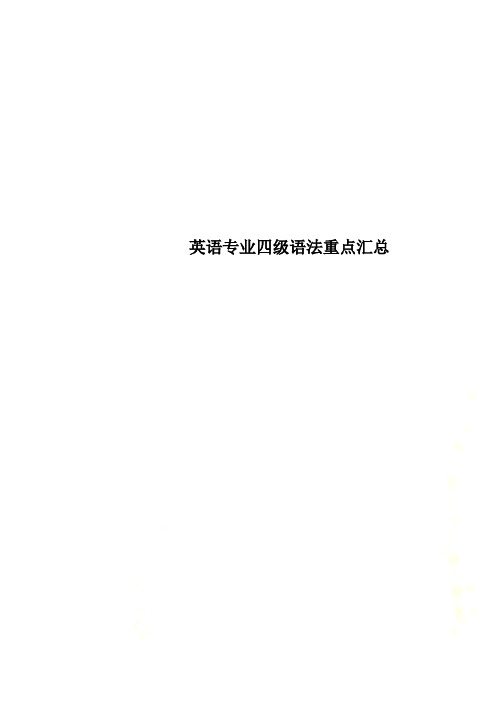
英语专业四级语法重点汇总English英语专八专四学习复习资料英语专四语法重点汇总一、非谓语动词的主要考点1. 有些典型动词后面可以接上不定式或动名词来做宾语的,但是在意思上是有区别的,主要常考到的动词罗列如下:mean to do想要(做某事)VS mean doing意味(做某事)propose to do 打算(做某事)VS propose doing建议(做某事)forget to do忘记(要做的事)VS forget doing忘记(已做的事)remember to do记得(要做某事)VS remember doing记得(做过)go on to do继而(做另一件事)VS go on doing继续(做原来的事)stop to do停下来去做另一件事VS stop doing停止正在做的事regret to do(对将要做的事)遗憾VS regret doing(对已做过的事)后悔2. 不定式的习惯用法典型句型整理如下:如:“cannot help but do”——“不得不做某事”如:“cannot but do”——“不禁做某事”如:“cannot choose but do”——“不由自主地做某事”如:“can do nothing but do”——“不能不做某事”如:“have no choice but to do”——“只能做某事”如:“have no alternative but to do”——“只能做某事”例句:The boy cannot help but be greatly influenced by the useful instruction given by his family tutor.When I start my job career, I cannot choose but look back upon the beautiful days I spent on campus.3. 动名词的习惯用法典型动名词的习惯句型整理罗列如下:如:be busy/active doing sth.如:It’s no good/use doing sth.如:spend/waste time doing sth.如:have difficulty/trouble/problem doing sth.如:have a good/great/wonderful time doing sth.如:There is no point/sense/harm/ use doing sth.例句:There is no use crying over spilt milk.(典型例句)牛奶洒了,哭也没用;后悔是没有用的;覆水难受I really have problem solving these mathematic questions since I am not major in science after all.二、形容词与副词及其比较级1. 形容词的句法功能形容词通常在句子中用做定语、表语与主语的语法成分,通常考到的知识点总结如下:(1) 以“a”开头的形容词如“alone”、“alike”、“asleep”、“awake”等一般不能做前置定语,通常是做表语或后置定语的例句:Jerry didn’t pass the important final exam, please let him alone for the time being.Michael came back from job just now, and his eyes were shut and he seemed to have fallen asleep.(2) 某些以副词词缀“-ly”结尾的词其实是形容词,不能看错是副词,例如“friendly”、“leisurely”、“lovely”等(3) 下列动词既是实义动词又是系动词,注意用做系动词时,要求形容词做表语这些典型单词罗列如下:“remain”、“keep”、“become”、“get”、“grow”、“go”、“come”、“turn”、“stay”、“stand”、“run”、“prove”、“seem”、“appear”、“look”等例句:The situation remains tense between the two countries at this juncture. 在这个节骨眼上,两国形势仍然持续紧张。
英语专业四级语法重点总结(精)
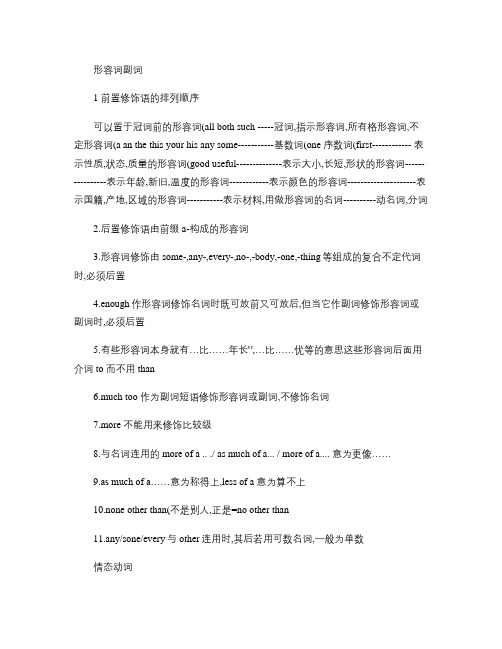
形容词副词1 前置修饰语的排列顺序可以置于冠词前的形容词(all both such -----冠词,指示形容词,所有格形容词,不定形容词(a an the this your his any some-----------基数词(one 序数词(first------------ 表示性质,状态,质量的形容词(good useful--------------表示大小,长短,形状的形容词----------------表示年龄,新旧,温度的形容词------------表示颜色的形容词---------------------表示国籍,产地,区域的形容词-----------表示材料,用做形容词的名词----------动名词,分词2.后置修饰语由前缀a-构成的形容词3.形容词修饰由some-,any-,every-,no-,-body,-one,-thing等组成的复合不定代词时,必须后置4.enough作形容词修饰名词时既可放前又可放后,但当它作副词修饰形容词或副词时,必须后置5.有些形容词本身就有…比……年长‟,…比……优等的意思这些形容词后面用介词to 而不用than6.much too 作为副词短语修饰形容词或副词,不修饰名词7.more 不能用来修饰比较级8.与名词连用的more of a .. ./ as much of a... / more of a.... 意为更像……9.as much of a……意为称得上,less of a 意为算不上10.none other than(不是别人,正是=no other than11.any/sone/every与other连用时,其后若用可数名词,一般为单数情态动词1.can 用于否定句cannot(helpbut表示不能不,只能(but后跟不带to的动词不定式2.must 表示禁止,一定不要时的否定式为mustn‟t当它表示有把握的推断时意为一定准是时它的否定形式为can‟t3.need doing=need to be done 这个句型表示被动意味4.need not have done sth 表示本来没有必要做某事(经常考虚拟语气1.It is (high/about/thetime... 谓语动词用过去式指现在或将来的情况表示早该做某事而现在已经有点晚了2.It is the first(second/thirdtime后的that从句中,谓语动词要用完成体来表示一种经验3.as if/though 的虚拟要点1 对当时事实的假设,从句谓语用过去式,be动词一律用were2对过去事实的假设,从句谓语用过去完成式3对未来事实的假设,从句谓语用would+动词原型专四语法重点总结比较级比较等级的含义英语中形容词与副词有三个比较等级,即原级,比较级和最高级。
英语专业四级考试语法复习资料大全

一、考纲要求及语法知识常考点(一)动词的基本时态、语态的构成及其用法2. 动词的语态1) 不能用于被动语态的动词和短语(1)在英语中,不及物动词不能用于被动语态,但有些不及物动词(包括短语)容易引起误用。
如:appear, belong to, die, escape, fall, happen, last, succeed, occur, take place, consist of。
Our success belongs to all the people present. 我们的成功属于在座的每一个人。
(2)某些表示状态或特征的及物动词,如:become, contain, cost, fit, have, resemble, suit也没有被动语态。
2) 少数动词的主动语态有时有被动的意思(专业四级英语重要考点)例1:The book is selling remarkably well.这本书卖得很好例2:The song sounds very beautiful. 这首歌听起来很优美。
能这样用的动词还有read(读起来),clean(擦起来),wash(洗起来),write(写起来)。
例3:My watch needs cleaning. (= My watch needs to be cleaned).能像need这样用的动词还有:want, require, deserve等。
例4:The meat is cooking.例5:The shop doesn’t open(营业)on Sunday. 试比较:The door was opened by Tom.3) 注意几个基本句型.(专业四级英语重要考点)It is said …(据说).,It is reported …(据报道), It is widely believed(人们广泛认为); It is expected …(据期望,应该)It is estimated…. ( 据估计), It was said…, It was believed … It was thought …( 以前人们认为...)。
学习必备专四语法总结
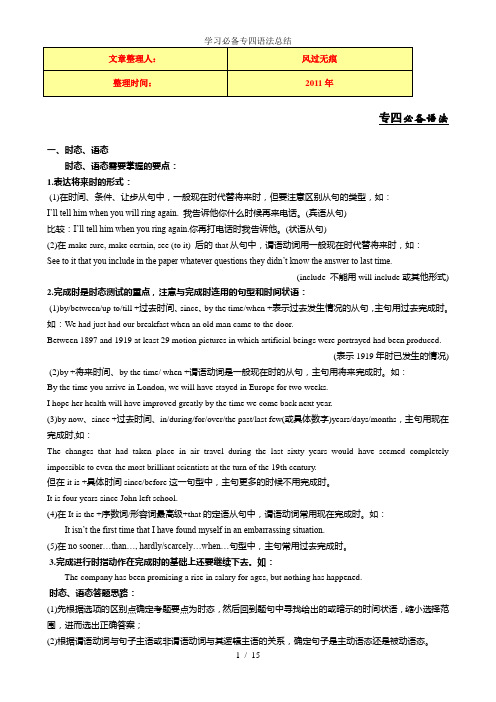
专四必备语法一、时态、语态时态、语态需要掌握的要点:1.表达将来时的形式:(1)在时间、条件、让步从句中,一般现在时代替将来时,但要注意区别从句的类型,如:I’ll tell him when you will ring again. 我告诉他你什么时候再来电话。
(宾语从句)比较:I’ll tell him when you ring again.你再打电话时我告诉他。
(状语从句)(2)在make sure, make certain, see (to it) 后的that从句中,谓语动词用一般现在时代替将来时,如:See to it that you include in the paper whatever questions they didn’t know the answer to last time.(include 不能用will include或其他形式) 2.完成时是时态测试的重点,注意与完成时连用的句型和时间状语:(1)by/between/up to/till +过去时间、since、by the time/when +表示过去发生情况的从句,主句用过去完成时。
如:We had just had our breakfast when an old man came to the door.Between 1897 and 1919 at least 29 motion pictures in which artificial beings were portrayed had been produced.(表示1919年时已发生的情况) (2)by +将来时间、by the time/ when +谓语动词是一般现在时的从句,主句用将来完成时。
如:By the time you arrive in London, we will have stayed in Europe for two weeks.I hope her health will have improved greatly by the time we come back next year.(3)by now、since +过去时间、in/during/for/over/the past/last few(或具体数字)years/days/months,主句用现在完成时,如:The changes that had taken place in air travel during the last sixty years would have seemed completely impossible to even the most brilliant scientists at the turn of the 19th century.但在it is +具体时间since/before这一句型中,主句更多的时候不用完成时。
(完整word版)英语专业四级考试语法汇总(word文档良心出品)

独立主格结构独立主格结构(Independent Genitive)有两部分组成,前一部份是名词或者代词,后一部分是非谓语动词(不定式、动名词和分词)或形容词、副词、或介词短语。
前后两部分具有逻辑主谓关系。
独立主格结构在句中做状语,多用于书面语。
独立主格结构本身不是句子,在句子中作状语,表示时间、原因、条件、伴随、目的等。
非谓语动词作状语,其逻辑主语须与主句主语保持一致。
若不一致,非谓语动词形式须另带主语,从而构成复合结构的形式作状语。
这种结构称为“独立结构”。
其中,非谓语动词主动用现在分词,被动用过去分词。
非谓语动词及其短语前面带有逻辑主语,逻辑主语的代词又是主格,故常称为“独立主格”。
“独立结构”在句中起状语作用,相当于状语从句,表示时间、原因、条件、方式或伴随等情况。
功能独立主格结构主要用于描绘性文字中,其作用相当于一个状语从句,常用来表示时间、原因、条件、行为方式或伴随情况等。
例如:表示时间The meeting being over, all of us went home. 开完会后我们都回家了。
Her work being done, she sat down for a cup of tea. 她干完了活,坐下来喝茶。
表示条件The condition being favorable, he may succeed. 若条件有利,他或许能成功。
表示原因There being no taxis, we had to walk. 没有出租车,我们只好步行。
He wrapped her up with great care, the night being dark and frosty. 夜又黑又冷,所以他把她裹得严严实实的。
表示伴随情况Almost all metals are good conductors, silver being the best of all. 几乎所有的金属都是良导体,而银则是最好的导体。
专四常考语法点汇总.doc

语法与词汇专项语法核心考点一:从属分句复合句 = 主句 +从句( 1 个或 1 个以上)要点1 从属分句是复合句必不可少的组成部分,以语法功能作为分类标准,从属分句可以分为状语从句、关系从句(即定语从句)和名词性从句。
其中状语从句可分为时间、地点、原因、结果、程度、目的、条件、让步和方式等;名词性从句可分为主语从句、宾语从句、表语从句、同位语从句。
要点 2 状语从句的考点集中在方式、条件、让步、方式和时间状语从句上;关系从句的考点集中在关系代词的选择,限制性定语从句和非限制性定语从句的区别;名词性从句的考点集中在宾语从句和同位语从句。
一状语从句状语从句真题剖析:1 Nine is to three _____ three is to one. (2008, 53)A. whenB. thatC. whichD. what2 ______ he wanted to go out with his friends at the weekend, he had tostay behind to finish his assignment. (2008, 55)A. Much thoughB. Much asC. As muchD. Thouth much3 Men differ from animals ____ they can think and speak. (2008, 54)A. for whichB. for thatC. in thatD. in which4 They stood chatting together as easily and naturally as ____. (2008,60)A. it could beB. could beC. it wasD. was5 The couple had no sooner got to the station ______ the coach left. (2009 ,60)A. whenB. asC. untilD. than6 ____ the boss says, it is unreasonable to ask meto work overtime withoutpay.(2010,55)A. WhateverB. WheneverC. WhicheverD. However7 Fool ____ Jerry is, he could not have done such a thing.A. whoB. asC. likeD. that8 He asked me to lend him some money, which I agreed to do, ___ thathe paid me back the following week. (2005)A. on occasionB. on purposeC. on conditionD. only if 9Which of the following contains an adverbial clause of causeA. I got a job as soon as I left university.B. As there was onanswer, I wrote again.C. You must do the exercise as I show you.D. Wealthy as he is, Mark is not a happy man.状语从句重点总结:(一)条件状语从句:表示条件或假设,通常由以下连词或结构引导:If 如果unless 如果不;除非as long as 只要so long as 只要on condition that条件是in the event that 如果,在的情况下provided/providing that 假如given that 如果suppose/supposing that 假如assuming (that ) 假如say 假如★特别提醒几种不常用的条件状语从句举例:In the event that she can not arrive on time, we will go first.Suppose it snowed, we would still go.Say what he said were true, what would you do about it(二)让步状语从句:含有“虽然,尽管,即使”之意,主要引导词有:though/although 虽然even if/even though 即使no matter + 疑问词无论疑问词 +ever 无论in spite of the fact that 尽管while 尽管much as 不管尽管for all that 尽管as/though granted/granting (that ) 虽然,尽管★特别提醒1.几种不常用的让步状语从句举例:In spite of the fact that he was deaf and dumb, he had a genius for music. While the grandparents love the children, they are strict with them.Much as she needed the job, she had to refuse.For all that there were a lot of difficulties,he finally entered the final competition and won.Granted you have made much progress, you should not be conceited.2. 用了 although 或 though ,就一定不能再后面的从句中同时用but ,但是though 可以和 yet 连用。
英语专四语法考点总结

一、语法部分考查重点1、虚拟语气的考点为: would rather+that从句+一般过去时;It is vital/ necessary/ important/ urgent/ imperative/ desirable/advisable/ natural/ essential+that+(should)动词原形;proposal/suggestion+that+动词原形;It is time/about time/high time+that+一般过去时;lest+that+should+动词原形;if only+that+would+动词原形。
2、状语从句的考点为:非if引导的条件状语从句,此类句子多用at times,provided,so long as,in case,once等来替代if;由even if/so,now that,for all等引导的让步状语从句;just/hardly...when引导的时间状语从句;more than,as...as,not so much as,the same as,as much as等引导的比较状语从句。
3、独立主格结构多以逻辑主语+分词的形式出现。
4、情态动词多与完成时形式连用。
5、定语从句重点考查介词+关系代词(which)和as作为关系代词。
二、词汇部分考查重点1、动词、名词与介词的搭配如:popular/patient+with;yield/solution/adapt/transfer/access+to;accuse/require+of;charge+for;under+discussion等等。
2、习惯用法如:confess to/set about/be used to+doing;be supposed to/have/make sb.+do等。
3、由同一动词构成的短语如:come,go,set,break等构成的短语。
- 1、下载文档前请自行甄别文档内容的完整性,平台不提供额外的编辑、内容补充、找答案等附加服务。
- 2、"仅部分预览"的文档,不可在线预览部分如存在完整性等问题,可反馈申请退款(可完整预览的文档不适用该条件!)。
- 3、如文档侵犯您的权益,请联系客服反馈,我们会尽快为您处理(人工客服工作时间:9:00-18:30)。
专四常考语法点汇总精编W O R D版IBM system office room 【A0816H-A0912AAAHH-GX8Q8-GNTHHJ8】语法与词汇专项语法核心考点一:从属分句复合句= 主句+从句(1个或1个以上)要点1从属分句是复合句必不可少的组成部分,以语法功能作为分类标准,从属分句可以分为状语从句、关系从句(即定语从句)和名词性从句。
其中状语从句可分为时间、地点、原因、结果、程度、目的、条件、让步和方式等;名词性从句可分为主语从句、宾语从句、表语从句、同位语从句。
要点2 状语从句的考点集中在方式、条件、让步、方式和时间状语从句上;关系从句的考点集中在关系代词的选择,限制性定语从句和非限制性定语从句的区别;名词性从句的考点集中在宾语从句和同位语从句。
一状语从句状语从句真题剖析:1 Nine is to three _____ three is to one. (2008, 53)A. whenB. thatC. whichD. what2 ______ he wanted to go out with his friends at the weekend, he had to stay behind to finish his assignment. (2008, 55)A. Much thoughB. Much asC. As muchD. Thouth much3 Men differ from animals ____ they can think and speak. (2008, 54)A. for whichB. for thatC. in thatD. in which4 They stood chatting together as easily and naturally as ____. (2008, 60)A. it could beB. could beC. it wasD. was5 The couple had no sooner got to the station ______ the coach left. (2009,60)A. whenB. asC. untilD. than6 ____ the boss says, it is unreasonable to ask me to work overtime without pay. (2010,55)A. WhateverB. WheneverC. WhicheverD. However7 Fool ____ Jerry is, he could not have done such a thing.A. whoB. asC. likeD. that8 He asked me to lend him some money, which I agreed to do, ___ that he paid me back the following week. (2005)A. on occasionB. on purposeC. on conditionD. only if9 Which of the following contains an adverbial clause of cause?A. I got a job as soon as I left university.B. As there was on answer, I wrote again.C. You must do the exercise as I show you.D. Wealthy as he is, Mark is not a happy man.状语从句重点总结:(一)条件状语从句:表示条件或假设,通常由以下连词或结构引导:★特别提醒几种不常用的条件状语从句举例:In the event that she can not arrive on time, we will go first. Suppose it snowed, we would still go.Say what he said were true, what would you do about it?(二)让步状语从句:含有“虽然,尽管,即使”之意,主要引导词有:★特别提醒1. 几种不常用的让步状语从句举例:In spite of the fact that he was deaf and dumb, he had a genius for music. While the grandparents love the children, they are strict with them.Much as she needed the job, she had to refuse.For all that there were a lot of difficulties, he finally entered the final competition and won.Granted you have made much progress, you should not be conceited.2. 用了although或though,就一定不能再后面的从句中同时用but,但是though可以和yet 连用。
Although they were very tired, but they still working. (true/false )Though they were very tired, yet they still working. (true/false )3. no matter +疑问词不能引导主语从句和宾语从句,可用疑问词+ever来引导主语从句和宾语从句。
No matter what he says has nothing to do withme. (true/false )Whatever he says has nothing to do withme. (true/false )The old man believes no matter what his son tells him (true/false )The old man believes whatever his son tells him (true/false )4. as/though引导的让步状语从句如果有强调的部分,通常将强调的部分置于句首。
Young as he was/ Child as he was, he could do some housework for his mother. = Young though he was/ Child though he was, he could do some housework for his mother.= Though he was young/ Though he was a child, he could do some housework for his mother.注意:as 引导的让步状语从句必须倒装,though引导的可以倒装也可以不倒装。
5. for all (that)表示让步概念,“that”可以省略,相当于“in spite of”或“in spite of the fact that”,其后可接短语或从句。
For all the fine words he may say to your face, he does not like you at heart. For all (that) you say, he will not change his mind.(三)时间状语从句:表示时间关系,引导词主要有以下:★特别提醒1 几种不常用的时间状语从句They went into action directly/immediately/instantly/the moment they heard the alarm.2 几种需要用完成时态的时间状语从句By the time I got there, they had left for the airport.It is the first time that I have visited China.It was the second time that I had visited China.He had hardly escaped when/before he was captured.I had no sooner reached home than it began to rain.I have been living there all the time since I moved there in 1992.3 否定词置于句首时注意倒装Hardly had he escaped when he was capured.No sooner had I reached there than it began to rain.4 when 引导时间状语从句,如果出现在后半句,可以表示“这时突然”之意。
I was almost hurt when the bus came to a sudden stop.5 表示时间先后的连词before可表示条件意义,译作“只有/必须……才能……”New ideas sometimes have to wait for years before they are fully accepted.(四)比较状语从句:可分为同级比较和不同级比较,同级比较通常由as引导,不同级比较通常由than引导。
注意几种特殊引导形式:★特别提醒1 几种不常用比较状语从句You were on time and so was I. (注意用倒装结构)Food is to men what/as oil is to machine.As food is important to men, so oil is to machine.He is no more a teacher than we are.He is no less a teacher than we are.It is not so much the actual population of the world as its rate of increase that catches my attention.The secret of success is not so much money as a strong will.2 注意比较状语从句中的省略结构,尤其需要注意根据省略的主语来选择谓语动词的单复数及动词时态。
